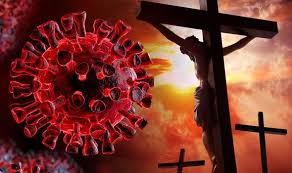
Blood has been the cause of much solemnity this year—both its infection and its wanton spilling. And while we were sheltering in place for a few months, we had a lot of time to consider our blood relation to God. Here’s a question about that bloodstream in this pandemic age:
Are people more like a virus or a bacterium?
The readings for the Solemnity of The Body and Blood of Christ–about the bread of life–inspired this question. Some bread—like sourdough—requires a starter formula consisting of bacteria and microorganisms that, the longer they live and collaborate, can help you continue making bread that’s more flavorful with each loaf. Some bakers have starter in their refrigerator that’s been around for a century. The bacteria in it are alive.
Viruses, on the other hand, are not considered to be “living” because they must leach off a host cell to sustain existence. They end up killing to stay alive. So, unlike bacteria, which are not only alive but exist to sustain life, viruses are lifeless parasites requiring a host cell to continue a kind of undead existence—like a vampire. Kind of fitting, considering all the conjecture connecting Covid 19’s origin to bats.
So, while we bacteria are alive and potentially beneficial, we’re also unpredictable. If we get out of balance in our interactions with each other, we can become infectious and deadly—and must be destroyed to protect the host. Such inscrutability is a gift and a curse—both to us and to our maker. As Sunday’s first reading tells us (Dt 8:2-3, 14b-16a), even God had to test his chosen people to prove their value to him.
Moses said to the people: “Remember how for forty years now the LORD, your God, has directed all your journeying in the desert, so as to test you by affliction and find out whether or not it was your intention to keep his commandments. He therefore let you be afflicted with hunger, and then fed you with manna, a food unknown to you and your fathers, in order to show you that not by bread alone does one live, but by every word that comes forth from the mouth of the LORD.
We must come together and take collective action to partake in our Father’s gifts, because where we bacteria are concerned, there’s power in numbers. He tested our reaction to the manna He rained down on us, and it not only kept us alive, but we developed a desire for it. So much so that we also developed a yen for fermented beverages like wine. And what is fermentation? It’s the process of yeast cell death. It’s a quiet, self-destructive process in which yeast expires in its own filth. The resulting “oozing” of yeast cell contents is said to give wine its flavor.
You may think this analogy of humanity to bacteria is itself breaking down. Which are we, the bacteria that feeds on God’s food or the bacteria that becomes the food God gives?
Both.
As Sunday’s second reading from Paul (1 Cor 10:16-17) tells us, our feast is a collaboration with our host.
The bread that we break, is it not a participation in the body of Christ? Because the loaf of bread is one, we, though many, are one body, for we all partake of the one loaf.
And then there’s Sunday’s gospel reading from John (Jn 6:51-58), in which Jesus—the sustainable bread of life sent from heaven—completes the analogy we started with:
“Amen, amen, I say to you, unless you eat the flesh of the Son of Man and drink his blood, you do not have life within you. Whoever eats my flesh and drinks my blood
has eternal life, and I will raise him on the last day. For my flesh is true food, and my blood is true drink. Whoever eats my flesh and drinks my blood remains in me and I in him.”
We are called to participate in a feast in which we become what we eat. Suddenly the idea of becoming a bacterium that oozes with life becomes a no-brainer considering the alternative of staying dead as a virus.
–Tom Andel